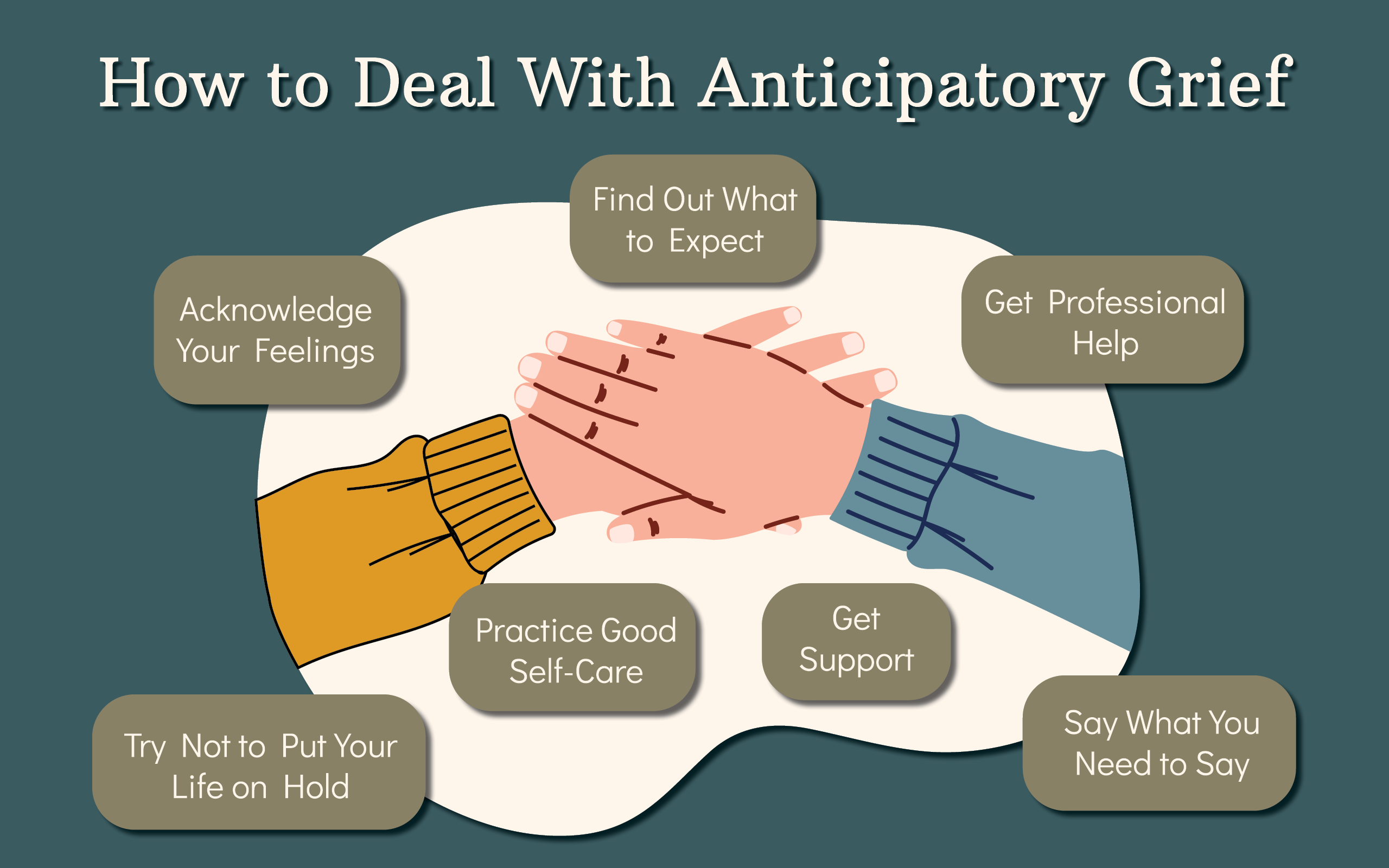How to Deal With Anticipatory Grief

Grief is a natural – and highly individualized – response to loss. But often, we begin grieving before experiencing the actual loss. Our sadness surrounding the anticipation of loss is known as anticipatory grief. Coping with anticipatory grief can be challenging, but there are a number of ways you can navigate this time with greater resiliency.
What is Anticipatory Grief?
Anticipatory grief shows up when we are aware that a loss is on its way. Pending absence, separation or significant life changes are at its root. Situations triggering anticipatory grief can include a pending divorce, loss of a job or home, or the terminal illness diagnosis of a loved one. While we haven’t yet experienced the actual loss, we may begin the grieving process early, knowing that a loss is inevitable. It’s a universally human experience to mourn the loss of something or someone that we deeply value. In the case of anticipatory grief, we mourn that loss prematurely.
Why Do People Experience Anticipatory Grief?
There are a number of reasons one may experience anticipatory grief, including an awareness of pending loss, a deep bond with an individual, and feeling a lack of control over the situation.
Awareness of a Pending Loss
When we lose something suddenly, we don’t have time to prepare our mind. But when we have a heads up that a loss is on the way, the grieving process can be triggered well in advance.
A Deep Bond or Emotional Attachment
When we are deeply connected to a person or situation, their loss will have a much greater impact on our life than the loss of something we are not as closely connected to. The stronger the bond, the more intense our sense of anticipatory grief may be.
Feeling a Lack of Control
It’s easy to think that the things we love will always be there. Knowing that a loss is inevitable creates a sense of uncertainty that can be uncomfortable.
Symptoms of Anticipatory Grief
Much like traditional grief, anticipatory grief is a highly individualized experience, offering up a range of emotions and physical symptoms.
Common symptoms of anticipatory grief include:
Heightened Vulnerability
Because we know a big loss is coming, worries can creep in about the future and our ability to get through the situation at hand. The lack of control we may feel can also increase feelings of vulnerability.
Loneliness or Isolation
Lethargy, lack of motivation and withdrawal from regular activities are a common symptom of anticipatory grief. Our changes in mood can also cause others in our support network to withdraw from us.
Anxiety
Feelings of fear or uneasiness can bring up traditional anxiety symptoms, including a rapid heartbeat, increased sweating, and overall tension.
Preoccupation with the Loss
It’s easy to become fixated on the situation at hand, or the person who is set to leave our life. This can make it difficult to maintain our health, current relationships, careers, and daily activities.
Changes in Relationships
We may find our relationships changing not only with the person we anticipate losing, but with others in our network as well. This can be triggered by a number of things including shifts in roles and emotional dynamics.
Can Anticipatory Grief Be Beneficial?
There are two schools of thought on whether anticipatory grief can be beneficial.
In many ways, anticipatory grief simply prolongs the grieving process, affecting our life in a negative manner long before it “should.” In the case of a dying loved one for example, anticipating the loss can cause us to treat them differently to the point of not enjoying time together. Our shifts in emotions and mood can also make the time more uncomfortable or sad for them.
However, using the same example above, having time to prepare for a loss provides an opportunity to spend more quality time with our loved one, finding meaningful ways to say goodbye.
Coping Strategies for Anticipatory Grief
Everyone’s grief journey is unique. While there is no “right” way to grieve, there are a number of ways to navigate anticipatory grief.
Acknowledge your Feelings
Give yourself permission to feel your full range of emotions, and express them to others. Don’t try to bottle them up – trust us, they will find their way out at some point!
Find out What to Expect
In the case of a terminal illness for example, learn the symptoms, side effects, and treatment options. Being in the know can help you to feel more in control of the situation.
Get Support
It’s important to find people you can speak openly to at this time. Check out local or online support groups to connect with others experiencing something similar, or reach out to friends and family for comfort and reassurance.
Try Not to Put Your Life on Hold
Continue to live your life. If you are in a caregiver role, ask for help when needed. Meet up with friends and try to have a little fun when you can. Keeping yourself in good energy helps not only you, but the other party as well.
Practice Good Self-Care
Find activities that bring you peace, like meditation, yoga, or time in nature. Eat healthy meals and get plenty of rest. Taking care of yourself is key during this time.
Say What You Need to Say
The benefit of anticipatory grief is that we have time to create a sense of closure and peace – for all parties. Have open, meaningful conversations with the person you anticipate losing. Don’t leave anything left unsaid, sharing your feelings and addressing any unresolved issues.
Get Professional Help
If your anticipatory grief is too much to handle on your own, find a therapist or counselor experienced in grief and loss for extra support and coping strategies.
How to Help a Friend Suffering From Anticipatory Grief
If a friend or loved one is experiencing anticipatory grief, there are a number of great ways you can support them:
Offer Specific Help
Many people will decline general offers for help. Provide specific examples of ways you can help them, such as grocery shopping, dropping off meals, picking up the mail, or babysitting.
Be Available
Anticipatory grief can create feelings of hopelessness and isolation. Let your friend know your availability for chatting or getting together.
Listen Up
Encourage them to talk about their feelings – and try to avoid giving unsolicited input or advice. Simply listening will give them space to vent or process their emotions in a safe space.
Grief Support in Orange County, CA
Experiencing anticipatory grief or symptoms of depression and anxiety? At Barn Life Recovery, we provide a safe and supportive environment, helping others learn to Love Life Again. In addition to our outpatient and partial hospitalization programs, we offer free community support groups. Learn more about our approach to see if we’re a good fit for you.










